- 3 Minutes to read
- Print
- DarkLight
- PDF
Currency Setup
- 3 Minutes to read
- Print
- DarkLight
- PDF
Currency denotes the monetary unit utilized for financial transactions and reporting within a consolidated entity, whereas Currency Type classifies currencies according to attributes such as stability or legal tender status. The Currency Setup page allows you to set up currency and currency types that can be used by a company as its Common Currency, Local Currency, or Interim Currency.
Currency Use Case - Common Currency vs. Local Currency
Let's say you load your financials in Euro, but for reporting purposes, you want to produce reports in USD. To accomplish this, proceed as follows:
- Make your application's Common Currency USD.
- Load the Euro financials via a DLR as Local Currency.
- Load the Euros to a Legal Entity that has Euros as the Currency.
- Load Exchange Rates for the Euro.
- With this in place, load the data as Local Currency (EURO) and run Currency Conversion to convert the Local Currency to Common Currency (USD).
- Then, when you are building your reports add the Reporting dimension to your Page-level selection and either choose Common Currency to show USD, or Local Currency to show the EURO.
The Currency Setup page has two tabs- Currency and Currency Type.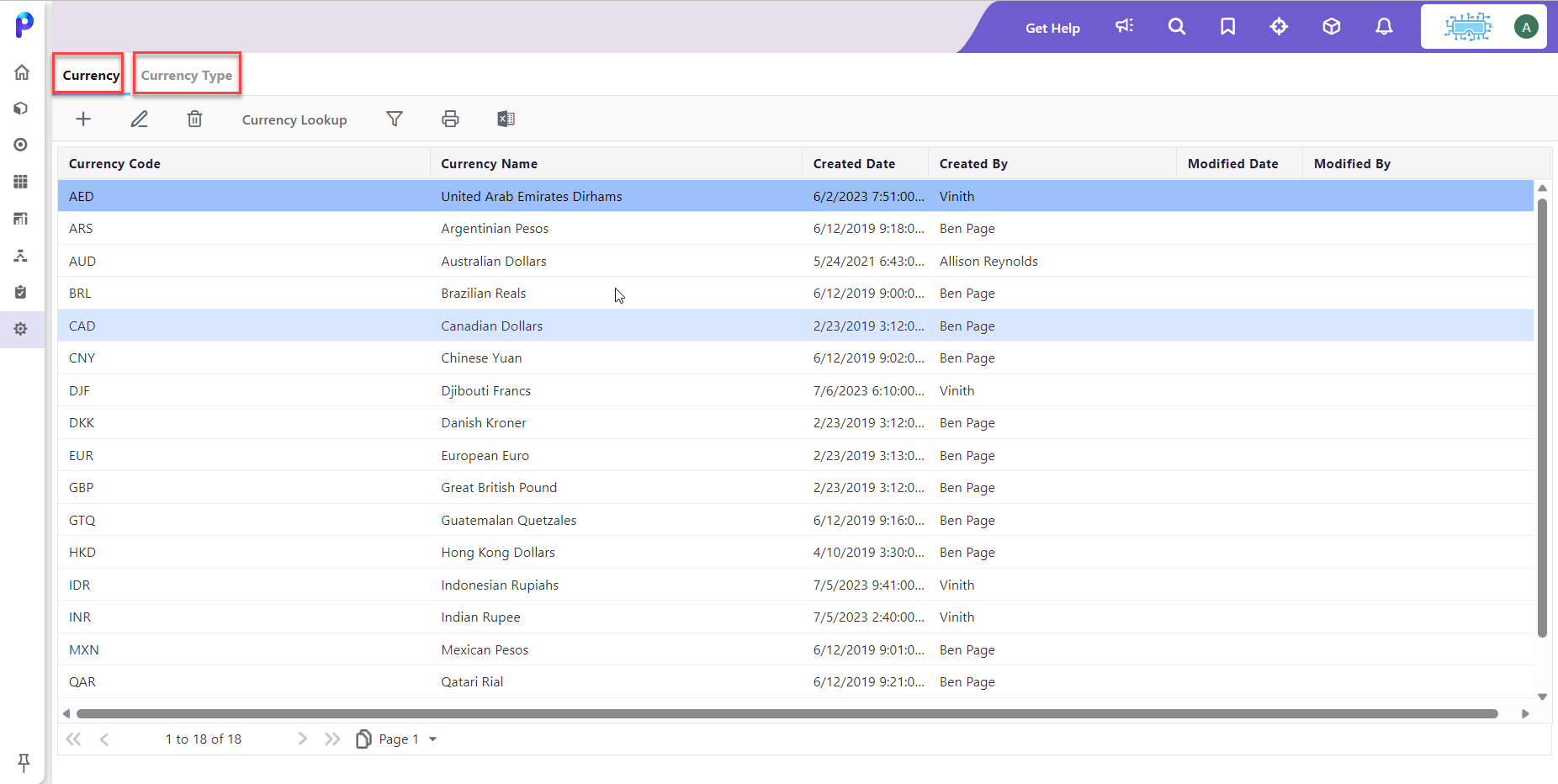
Currency
You can add a currency in the Currency tab. All the currencies available in the application are available under the Currency tab.
Add
- Navigate to Maintenance > Currency > Currency Setup.
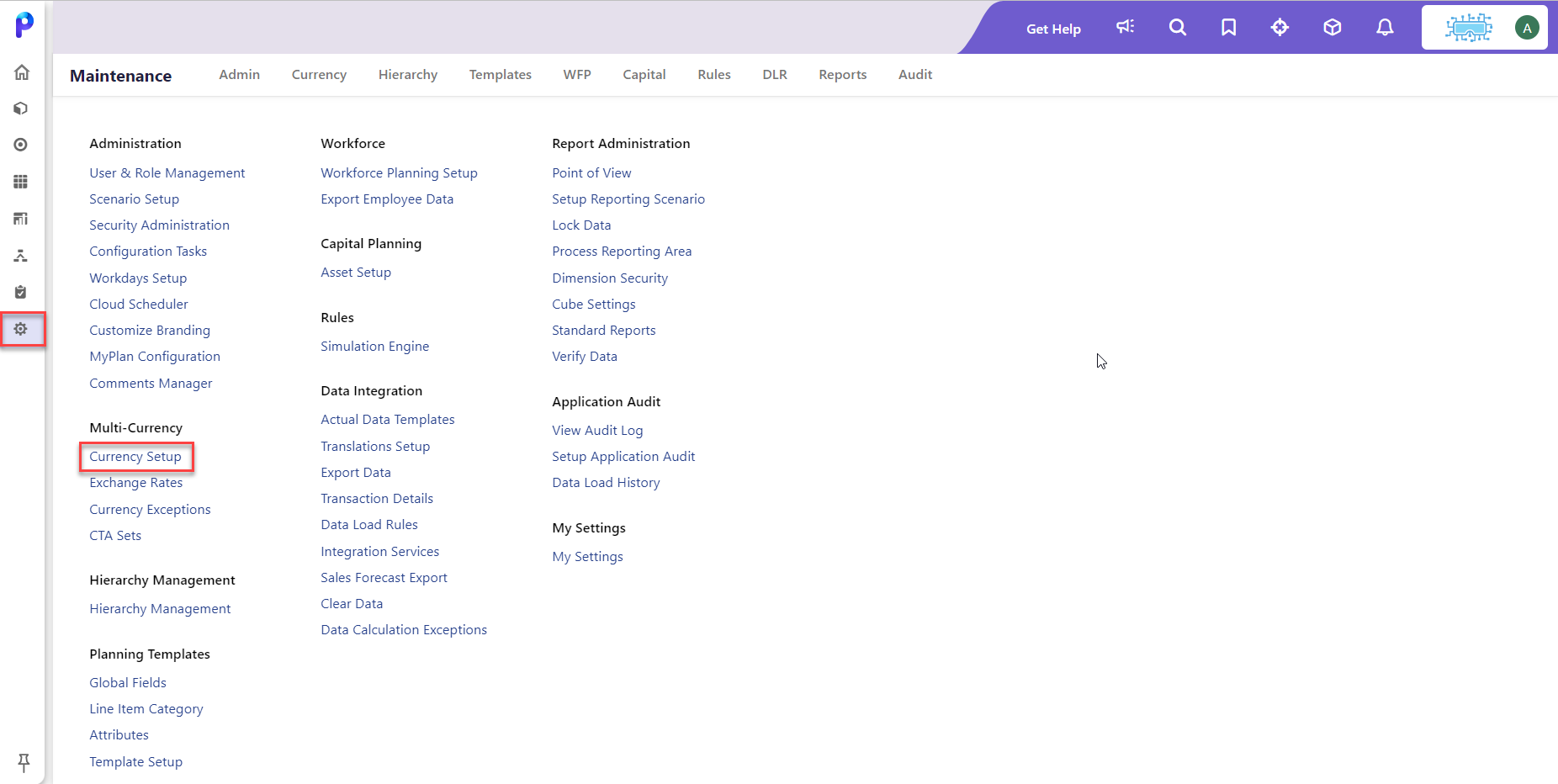
- Click the Add icon.
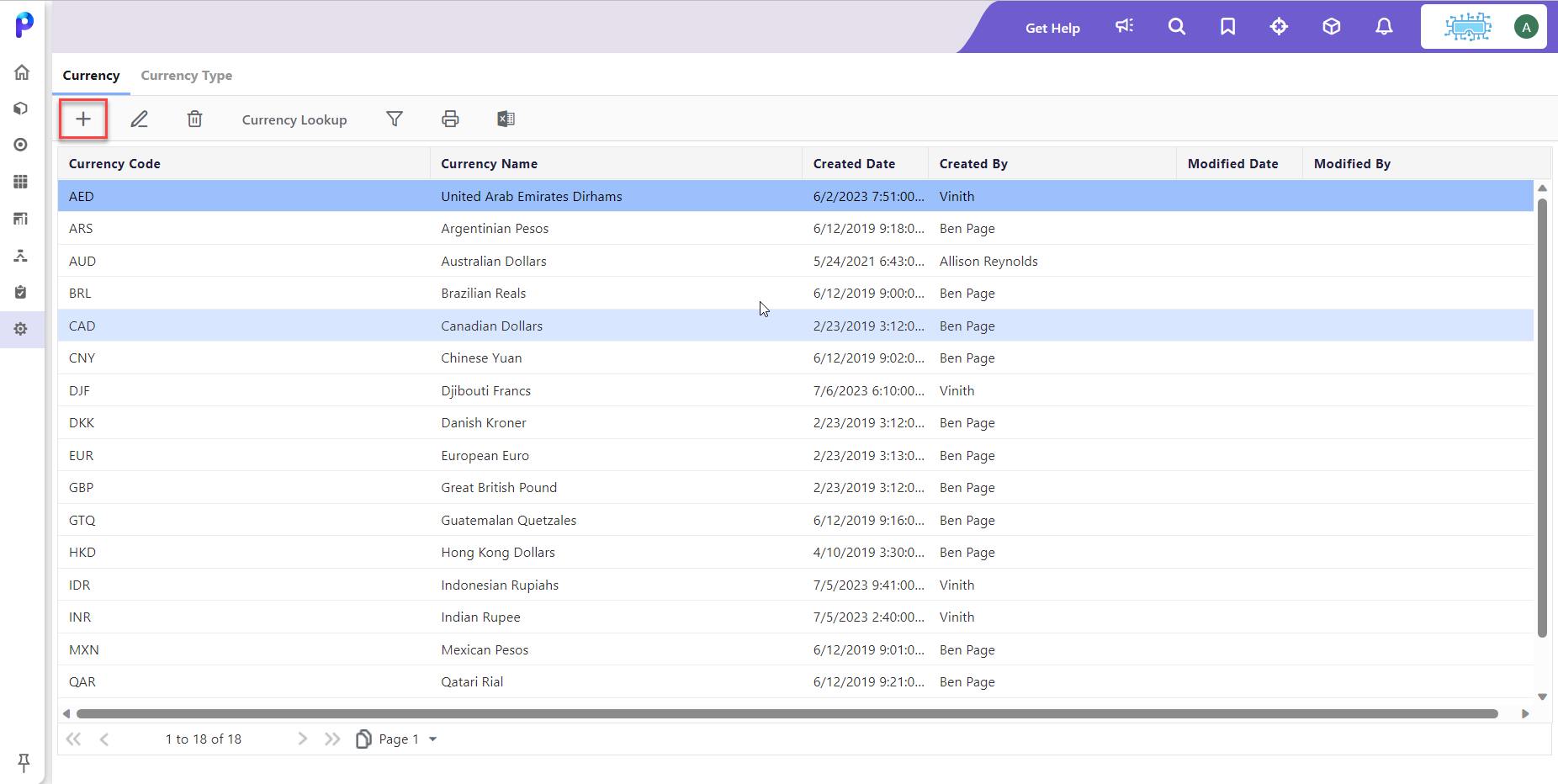
- Enter the Currency Code to identify the currency, for example, USD.
- Enter the Currency Name to identify the currency, for example, U.S. Dollars.
- Click the Save icon.
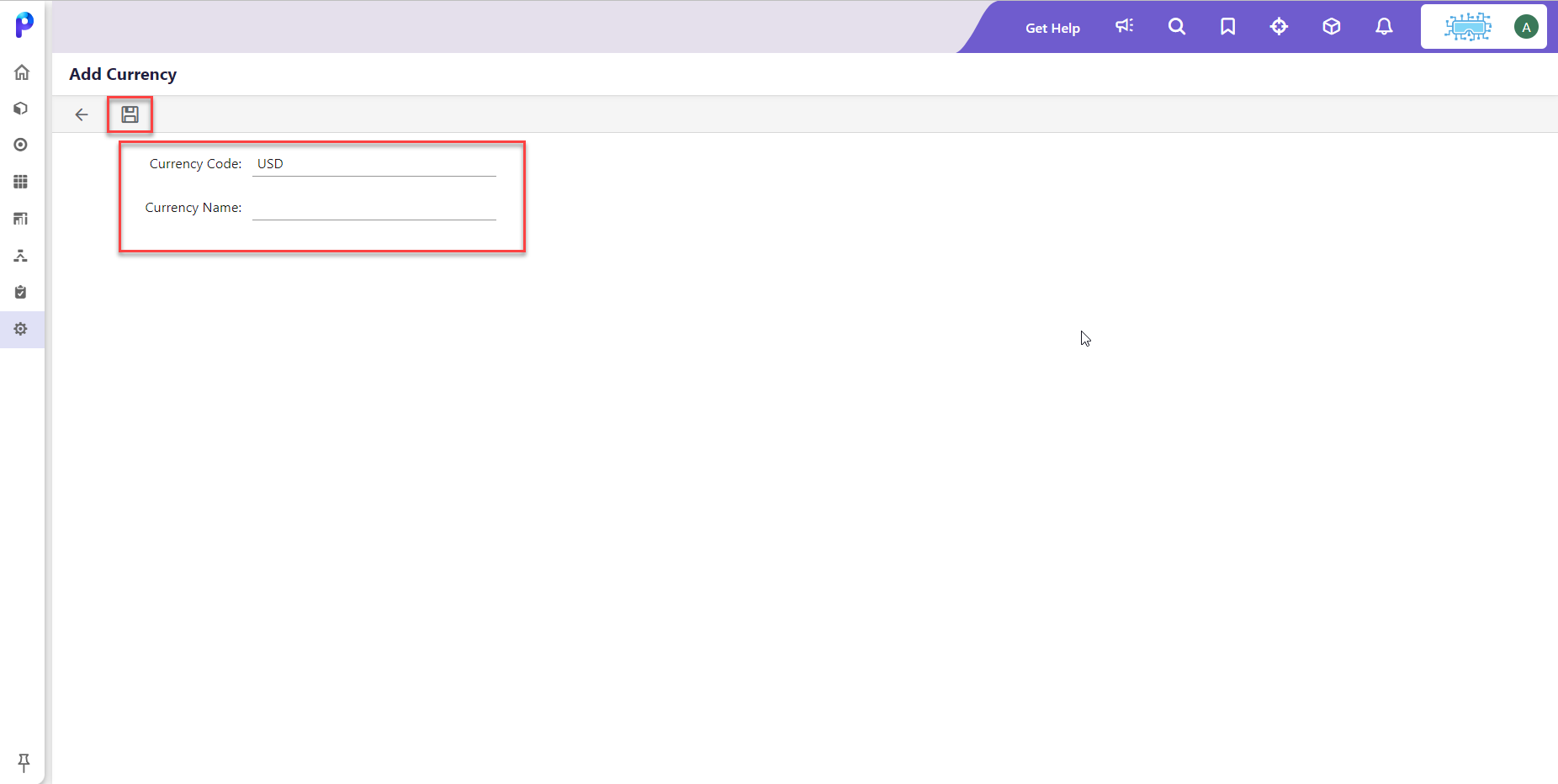
Edit
- Navigate to Maintenance > Currency > Currency Setup.

- Select a Currency from the list that you want to modify and click the Edit button.
.png)
- Edit the fields and click the Save icon.
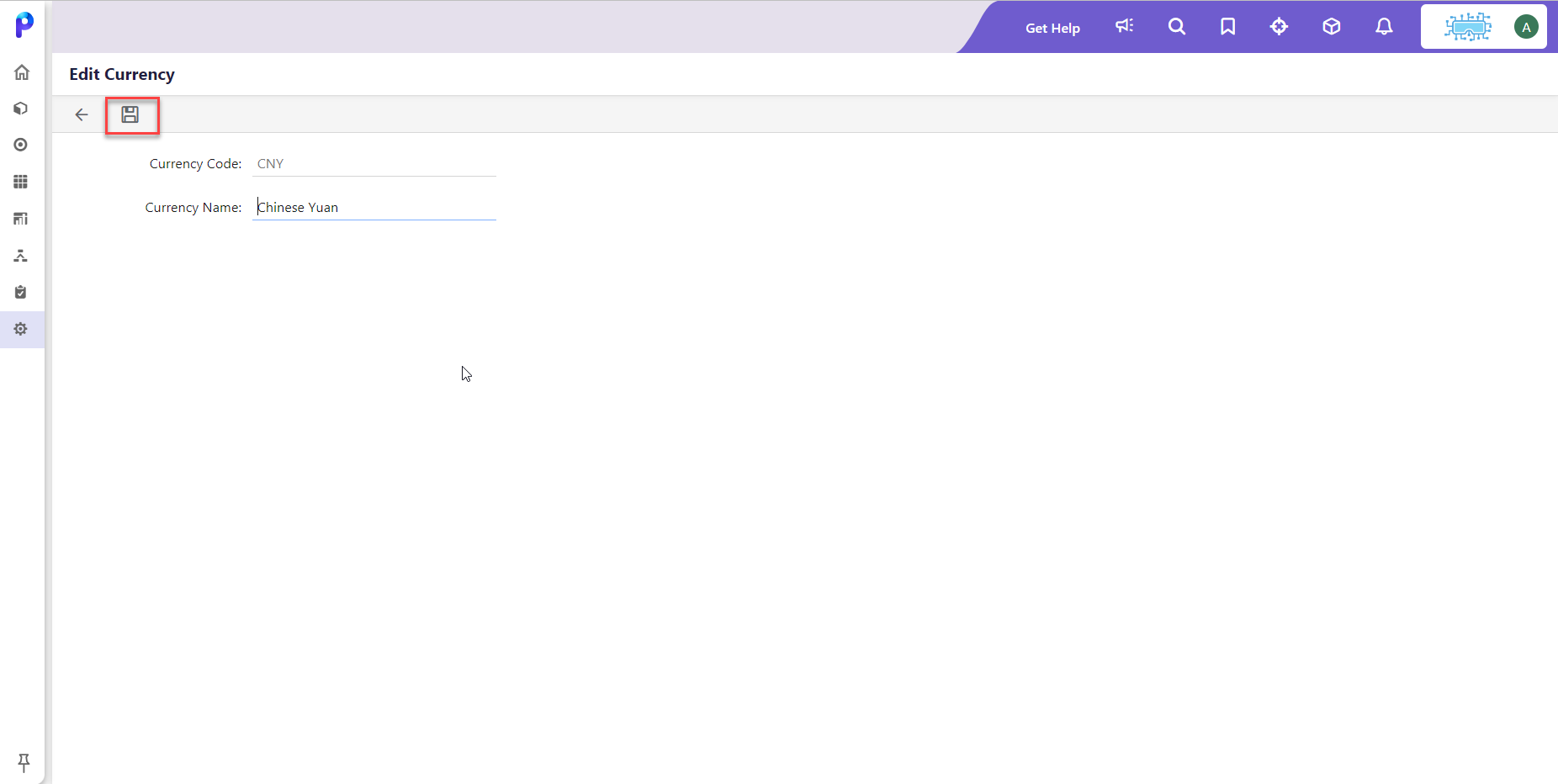
Delete
- Navigate to Maintenance > Currency > Currency Setup.

- Select a Currency from the list that you want to delete and click the Delete button.
.png)
- Click Delete to confirm deletion.
.png)
A confirmation message appears on the successful deletion of Currency.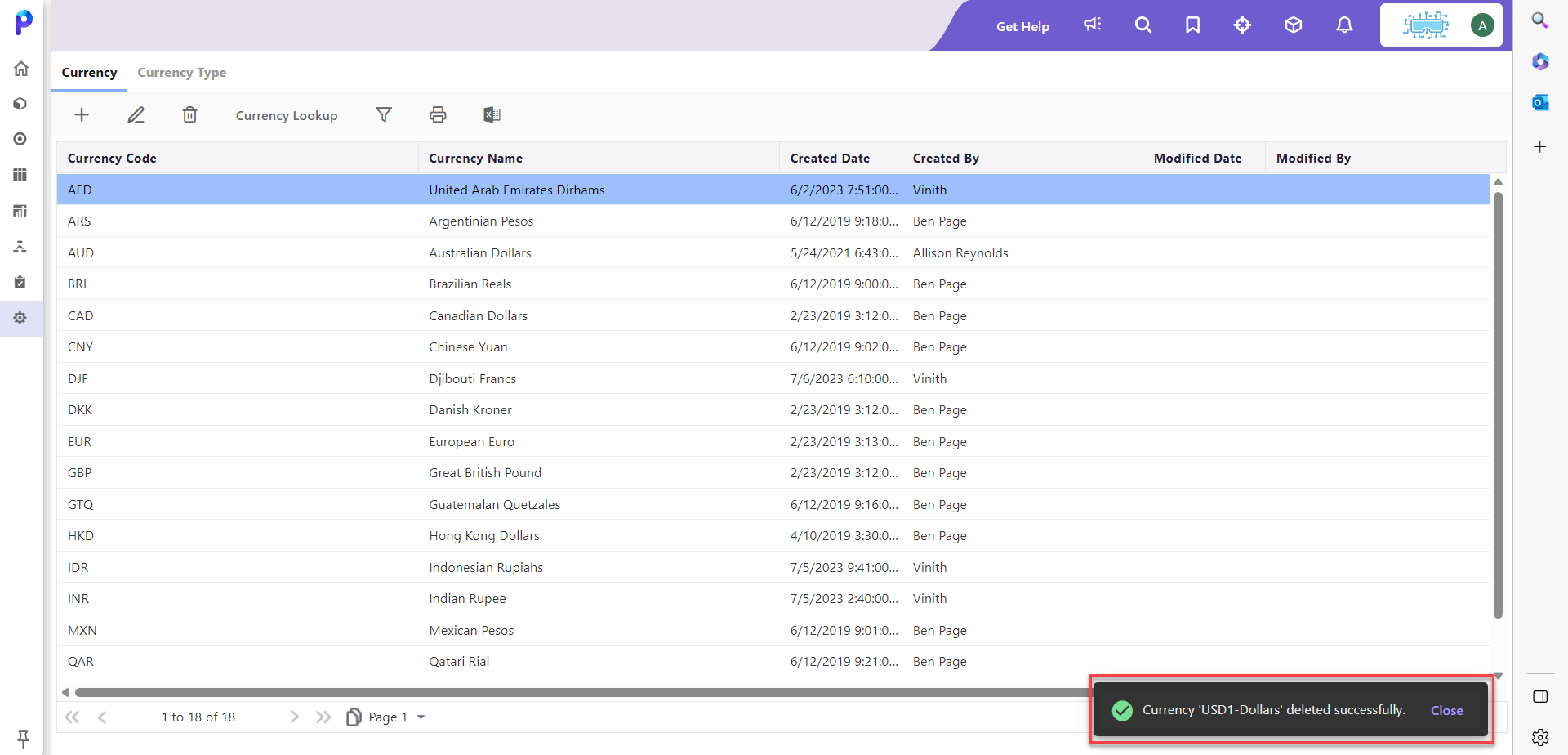
Currency Lookup
The Currency Lookup option offers search functionality for looking up currencies.
- Navigate to Maintenance > Currency > Currency Setup.

- Click Currency Lookup.
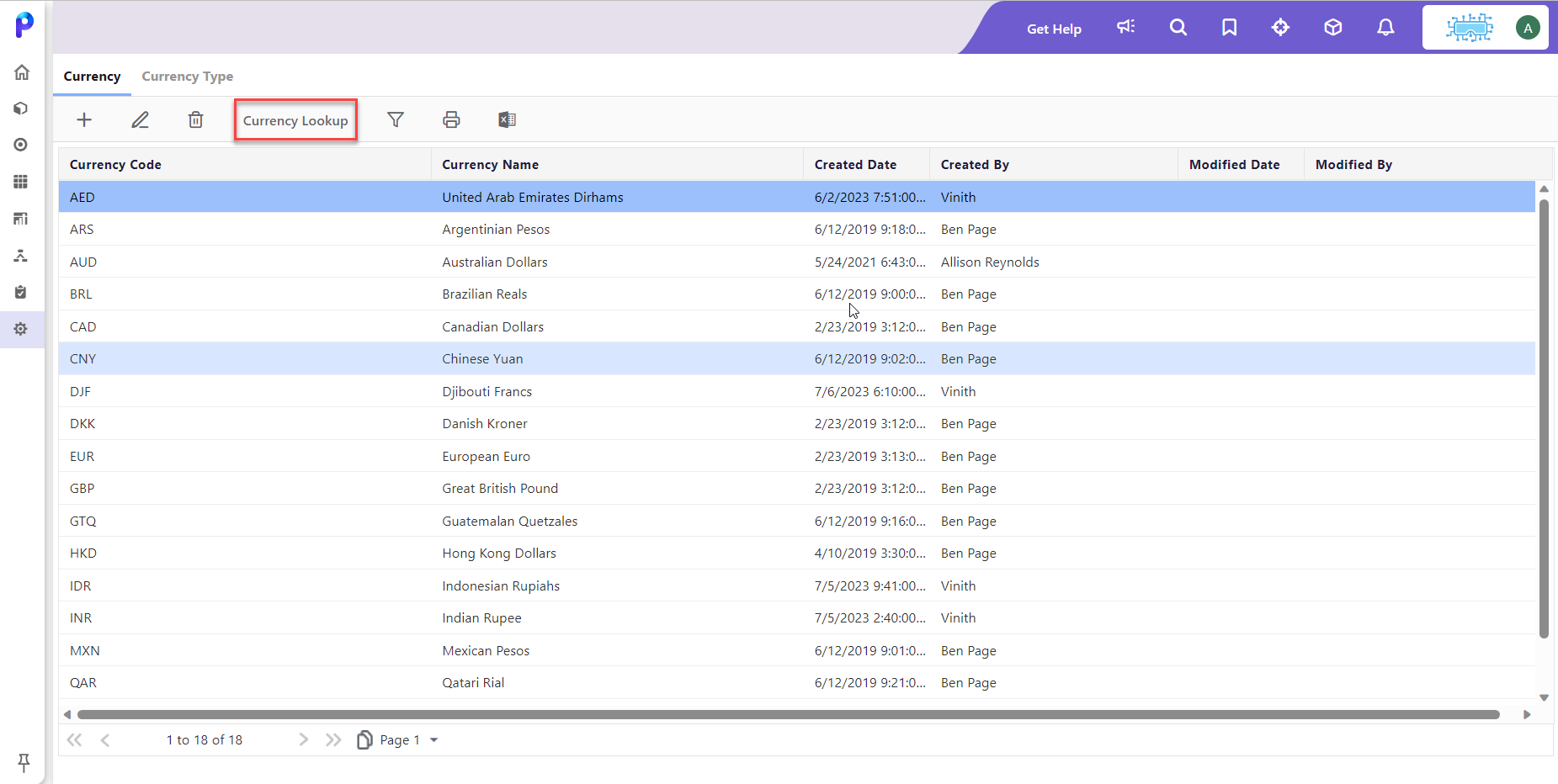
- Select currencies from the list. Alternatively, you can search for currencies by entering the Currency Code or the Currency Name.
- Click Save.
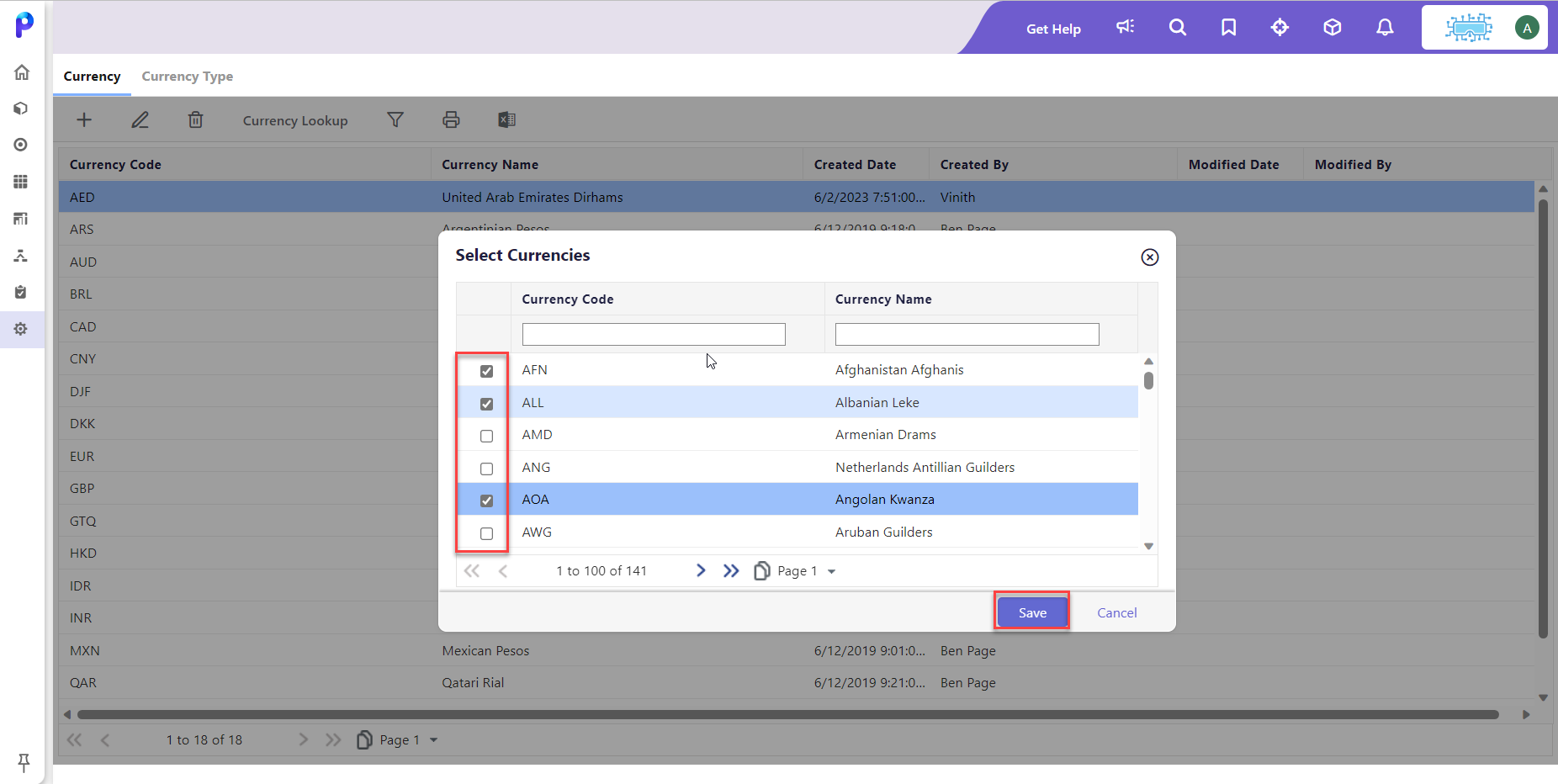
- The selected currencies are now displayed at the top of the page.
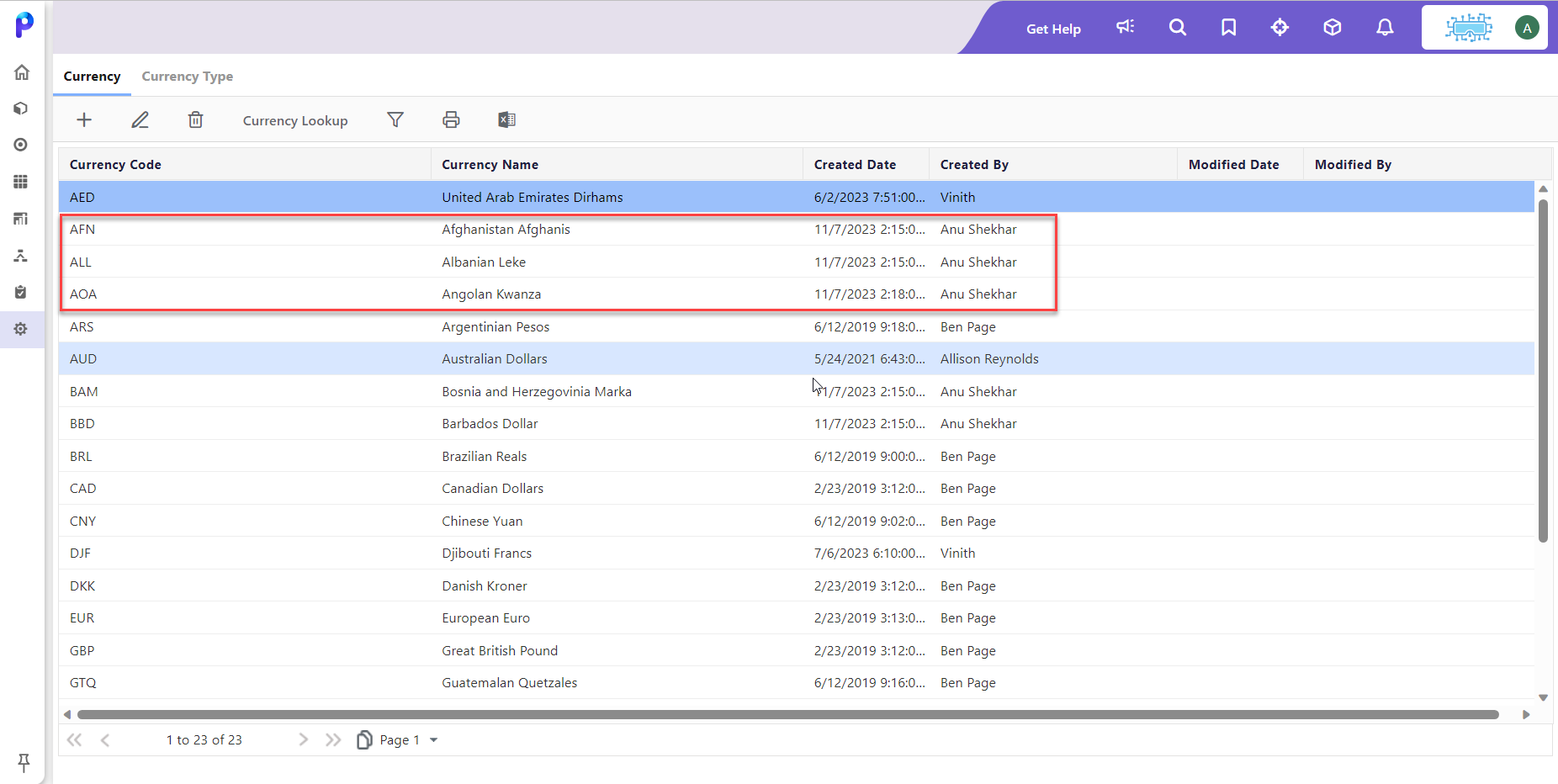
Apply Filter
Click Apply Filter to find out currencies based on Currency Code, Currency Name, Created Date, Created By, Modified Date, or Modified By..png)
Click Print to print the currency report..png)
Export as Excel
Click Export as Excel to export the currency report in Excel.
Currency Type
Currency types play a vital role in the currency conversion process, where accounts are converted using defined rate types. These currency types are associated with Natural Accounts (for example- cash, inventory, accounts payable, sales revenue, or salary expense), and it's common for various types of Natural Accounts to be converted with different rate types.
Add
- Navigate to Maintenance > Currency > Currency Setup.

- Click Currency Type.
- Click the Add icon.
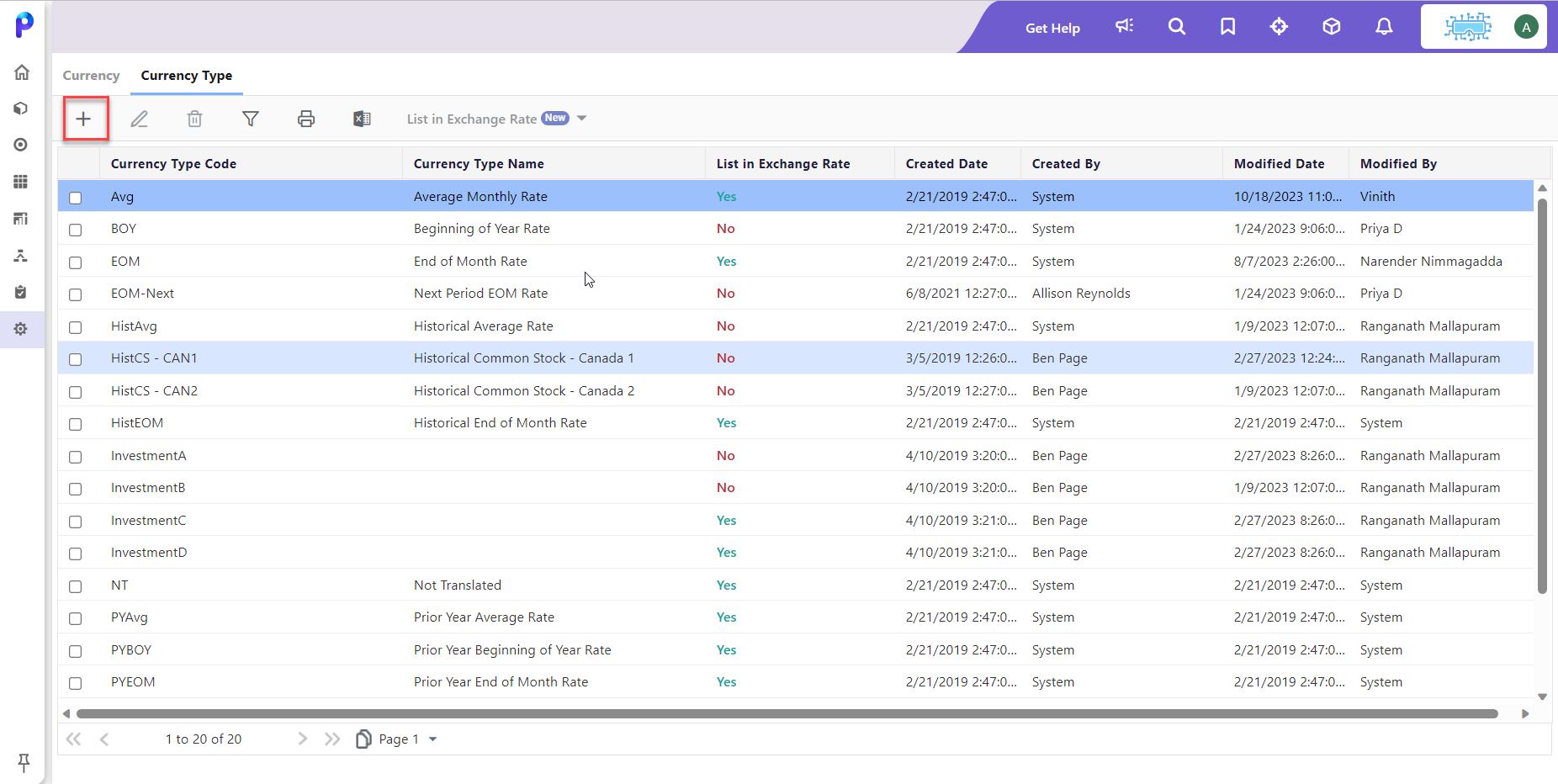
- Enter the Currency Type Code, for example, balance.
- Enter the Currency Type Name, for example, the end of month rate.
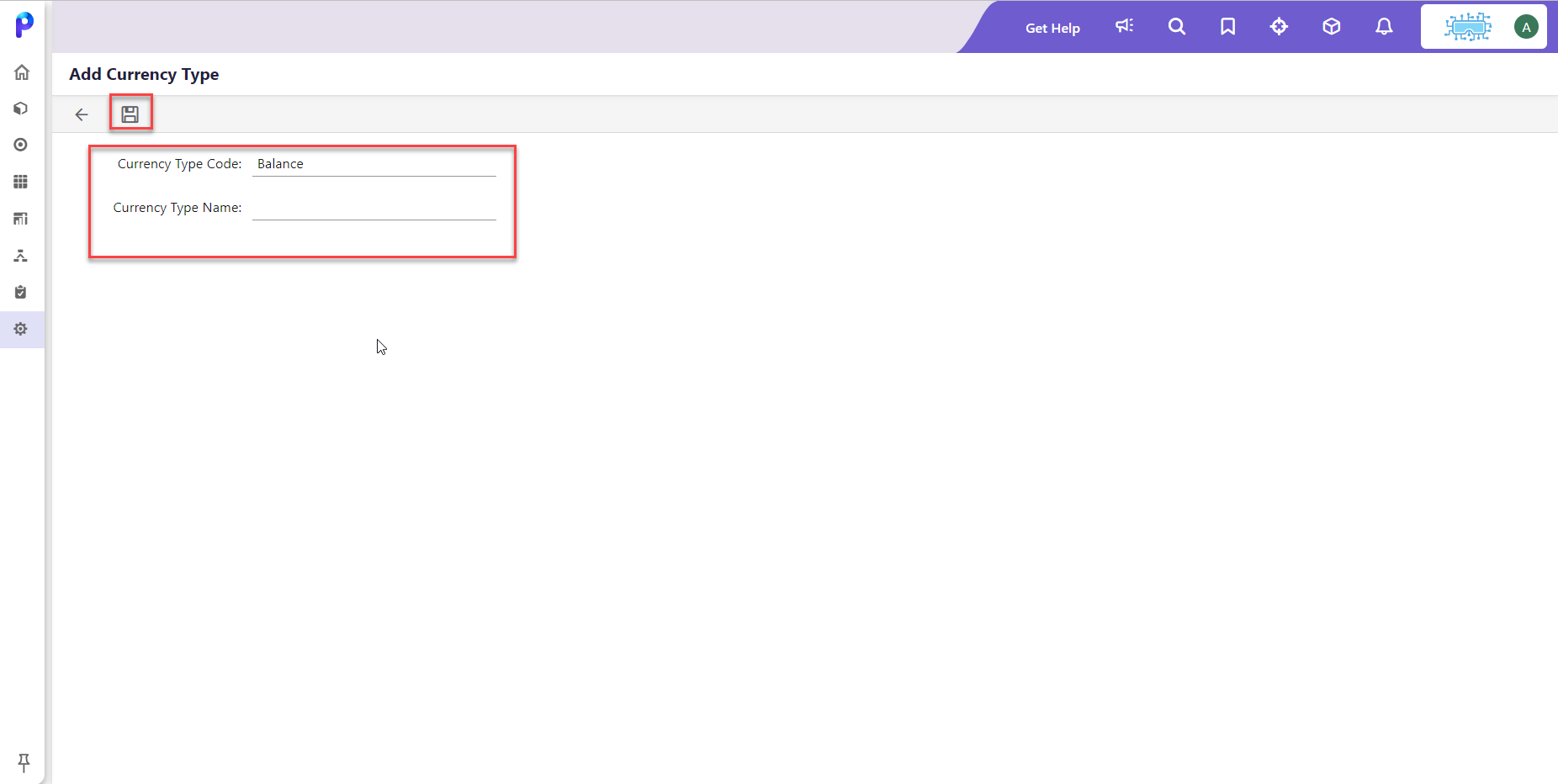
- Click Save. The currency type is added to the list.
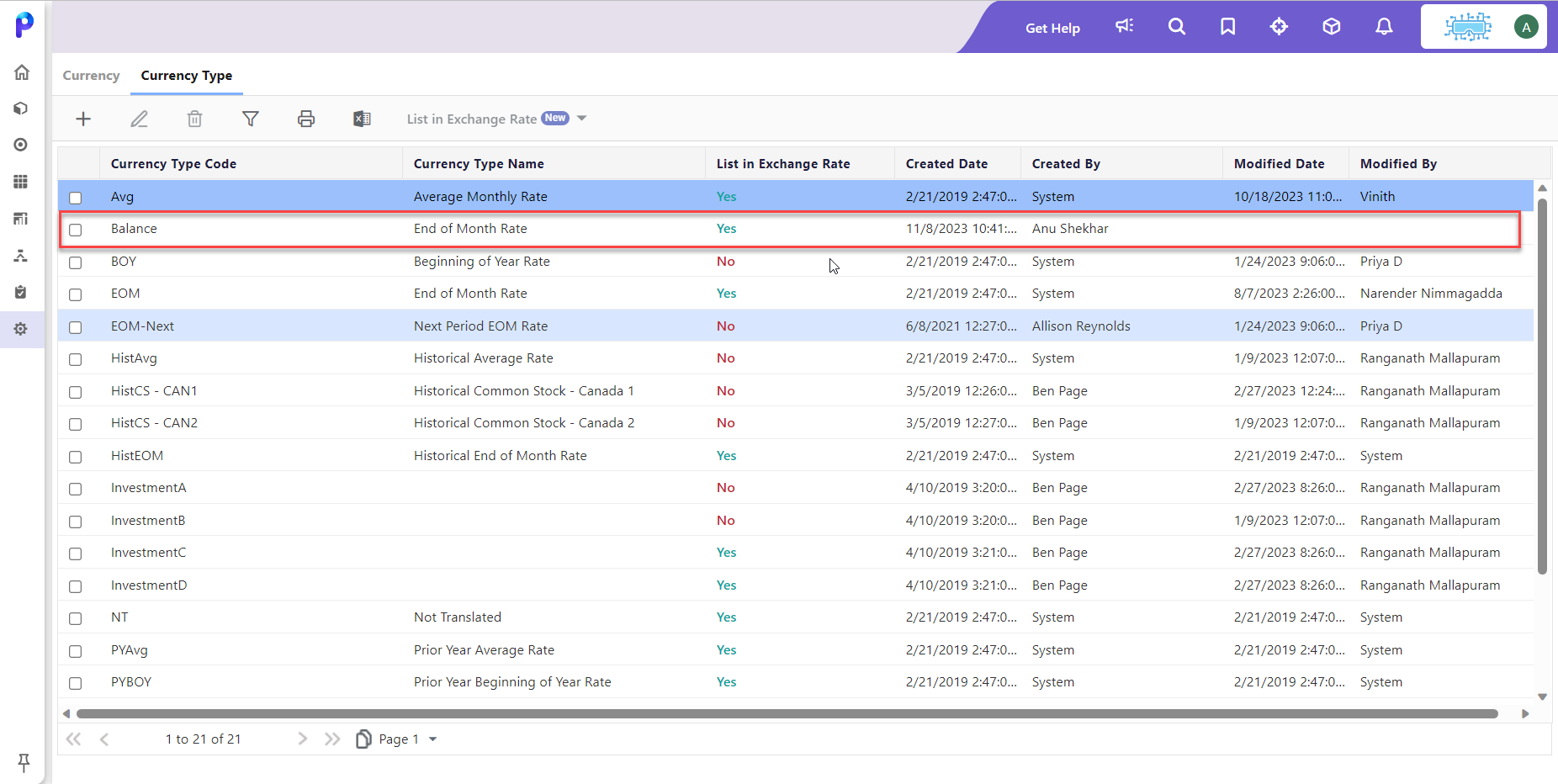
Edit
- Navigate to Maintenance > Currency > Currency Setup.

- Click Currency Type.
- Select a currency type from the list and click the Edit icon.
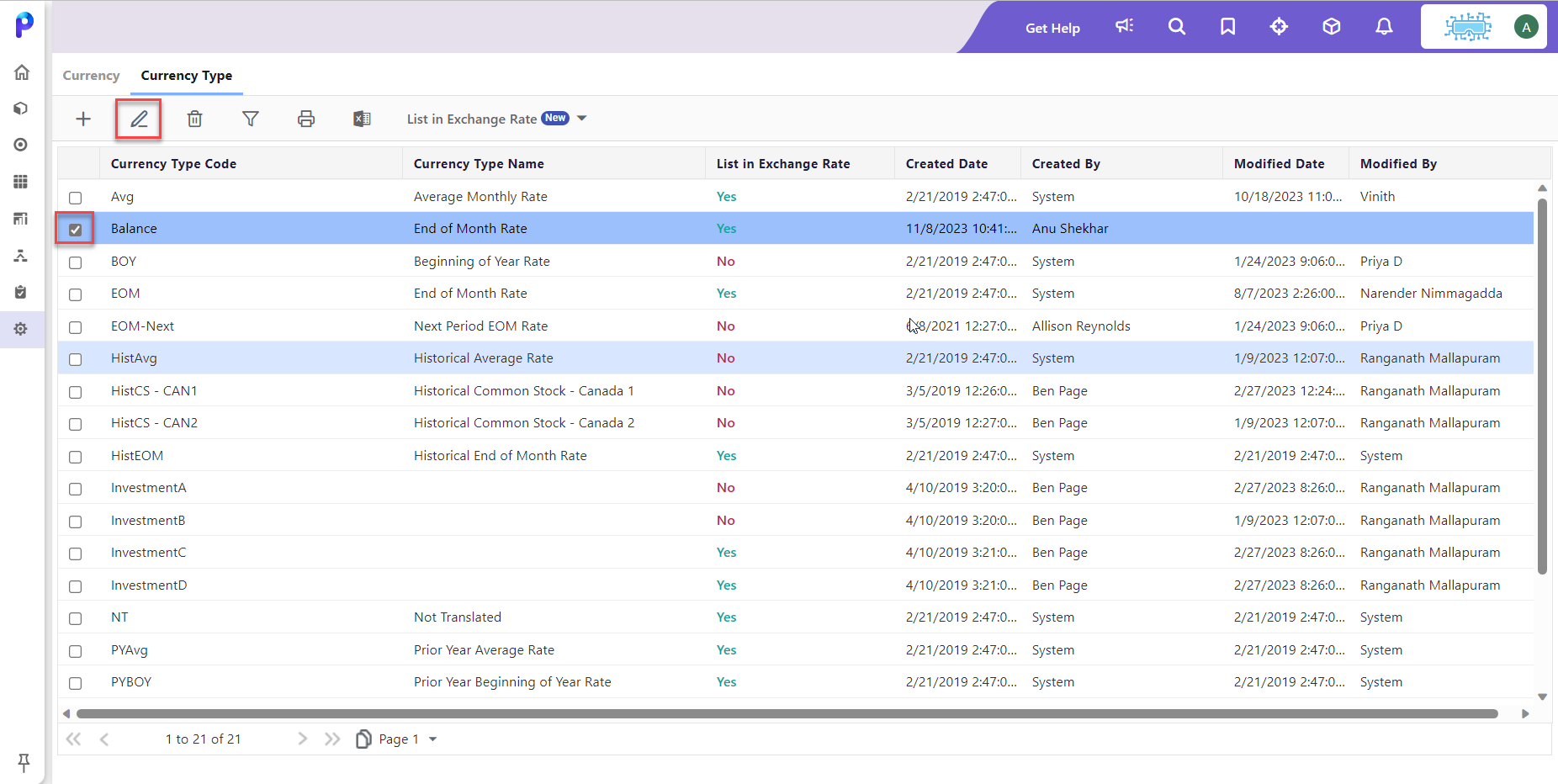
- Edit the fields and click the Save icon.
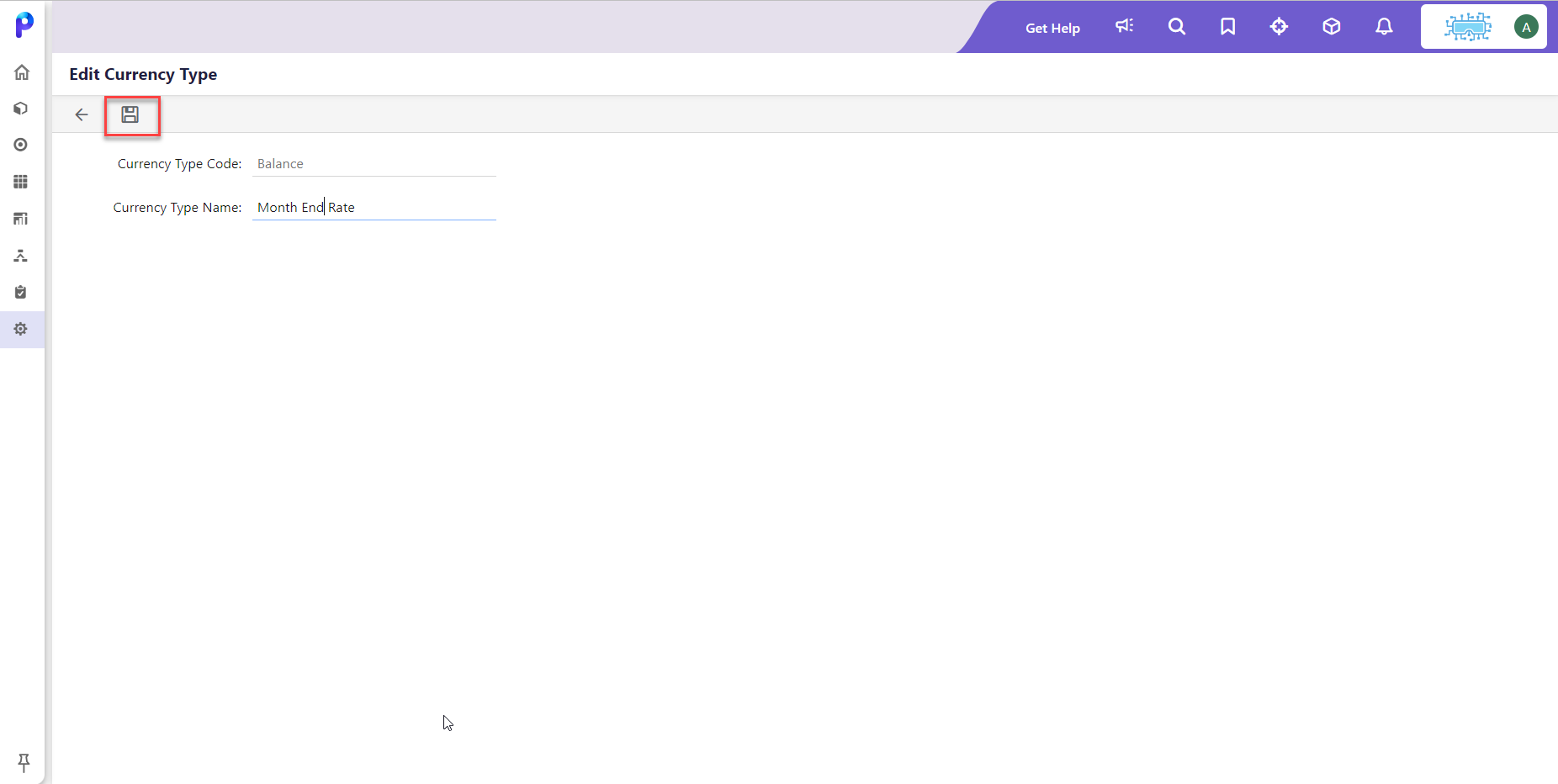
The Currency Type will be updated, and you will receive a confirmation message.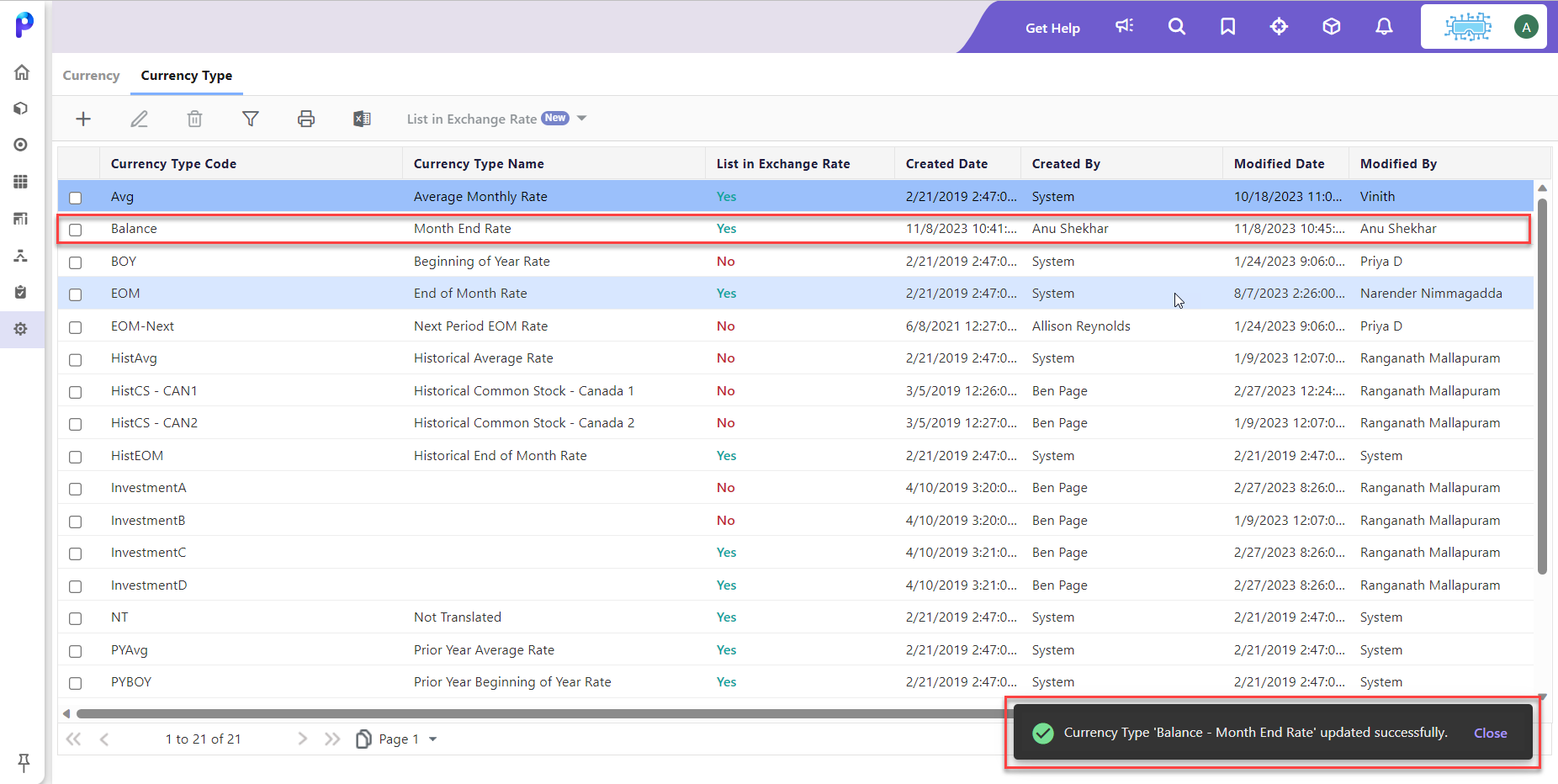
Delete
- Navigate to Maintenance > Currency > Currency Setup.

- Click Currency Type.
- Select a currency type from the list that you want to delete and click the Delete icon.
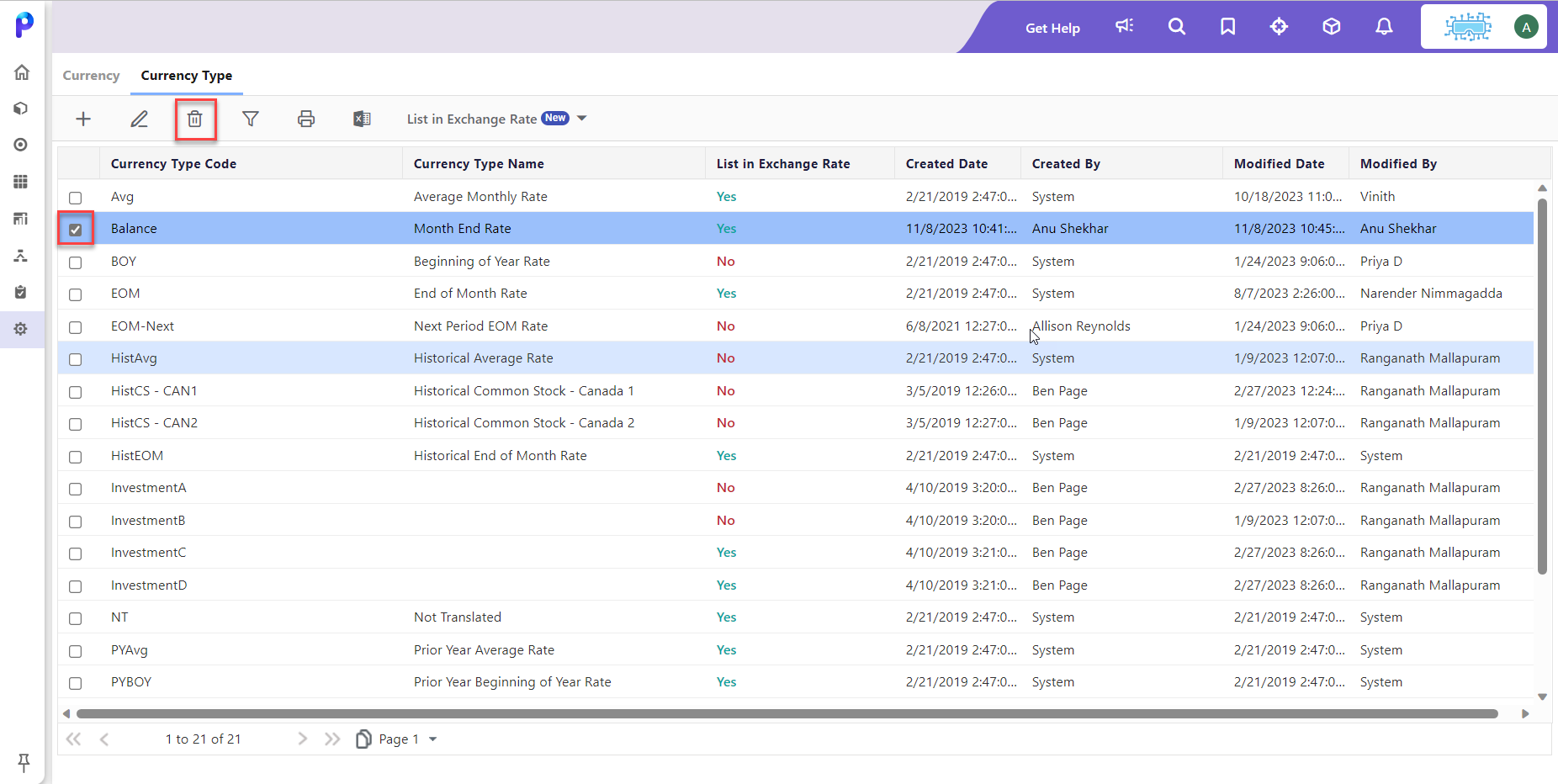
- Click Delete.

Apply Filter
Click the Apply Filter icon to search for currency types based on Currency Type Code, Currency Type Name, List in Exchange Rate, Created Date, Created By, Modified Date, or Modified By.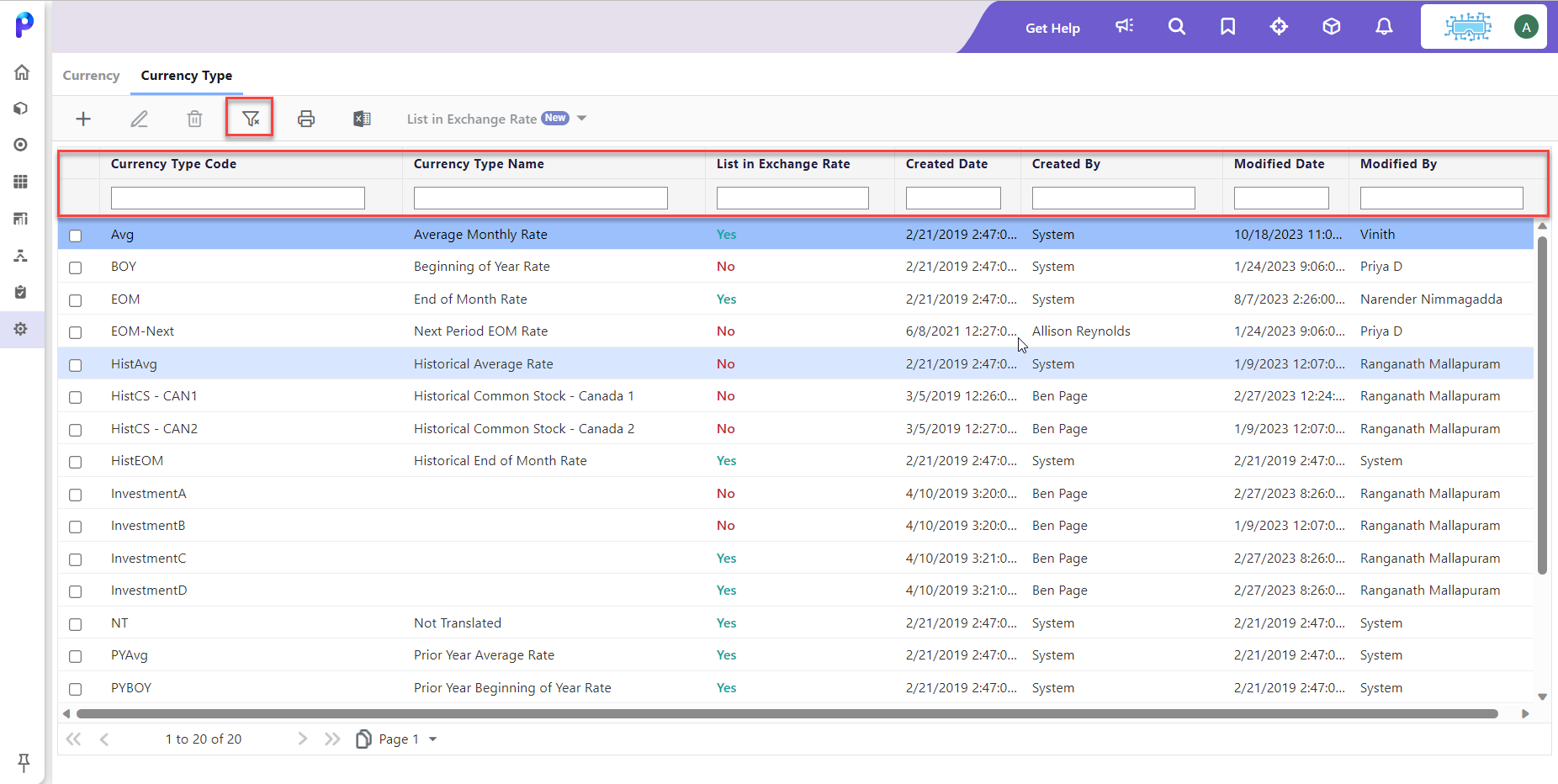
Click the Print icon to print the currency type report.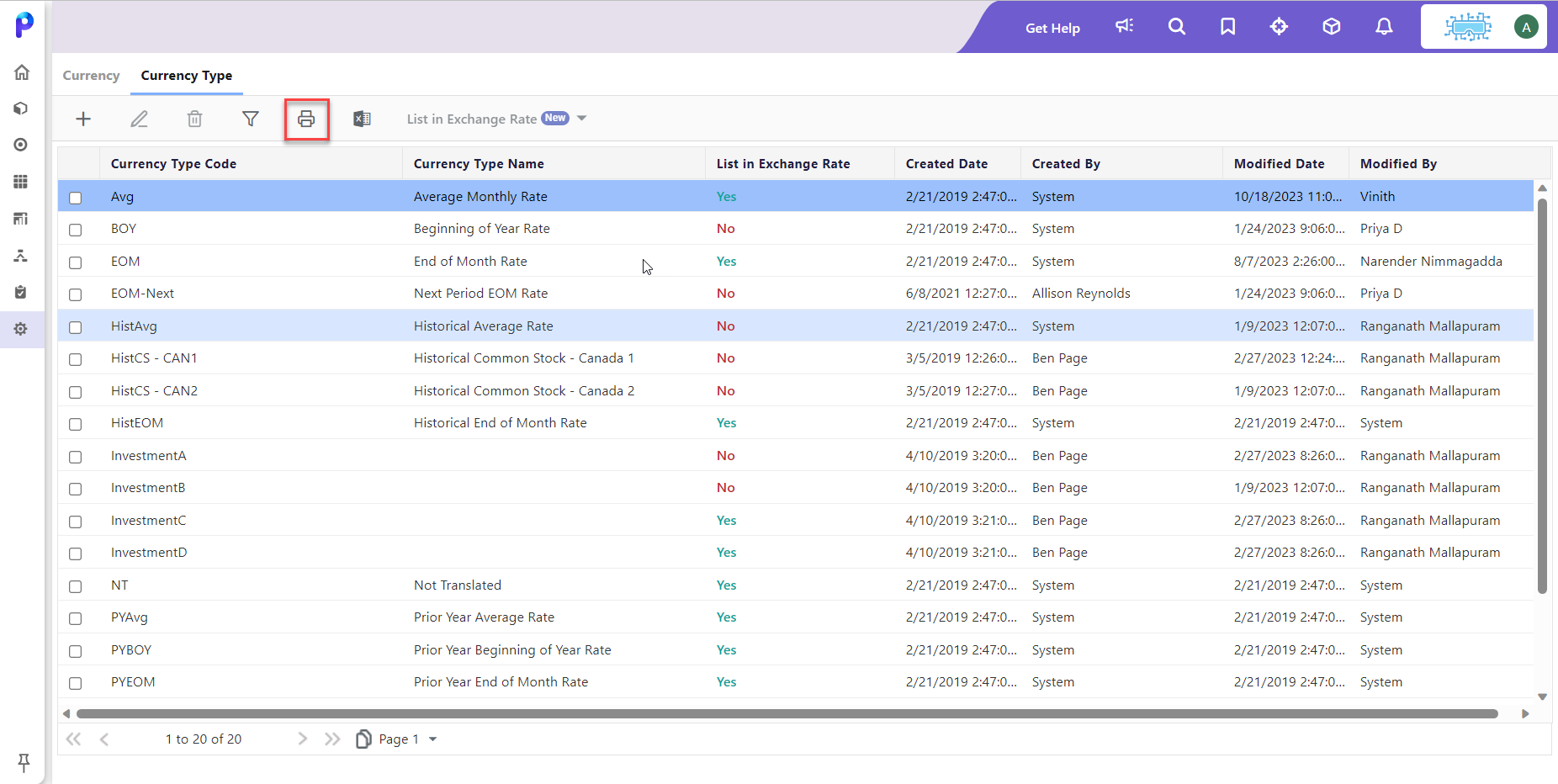
Export as Excel
Click the Export as Excel icon to export the currency type list report in Excel.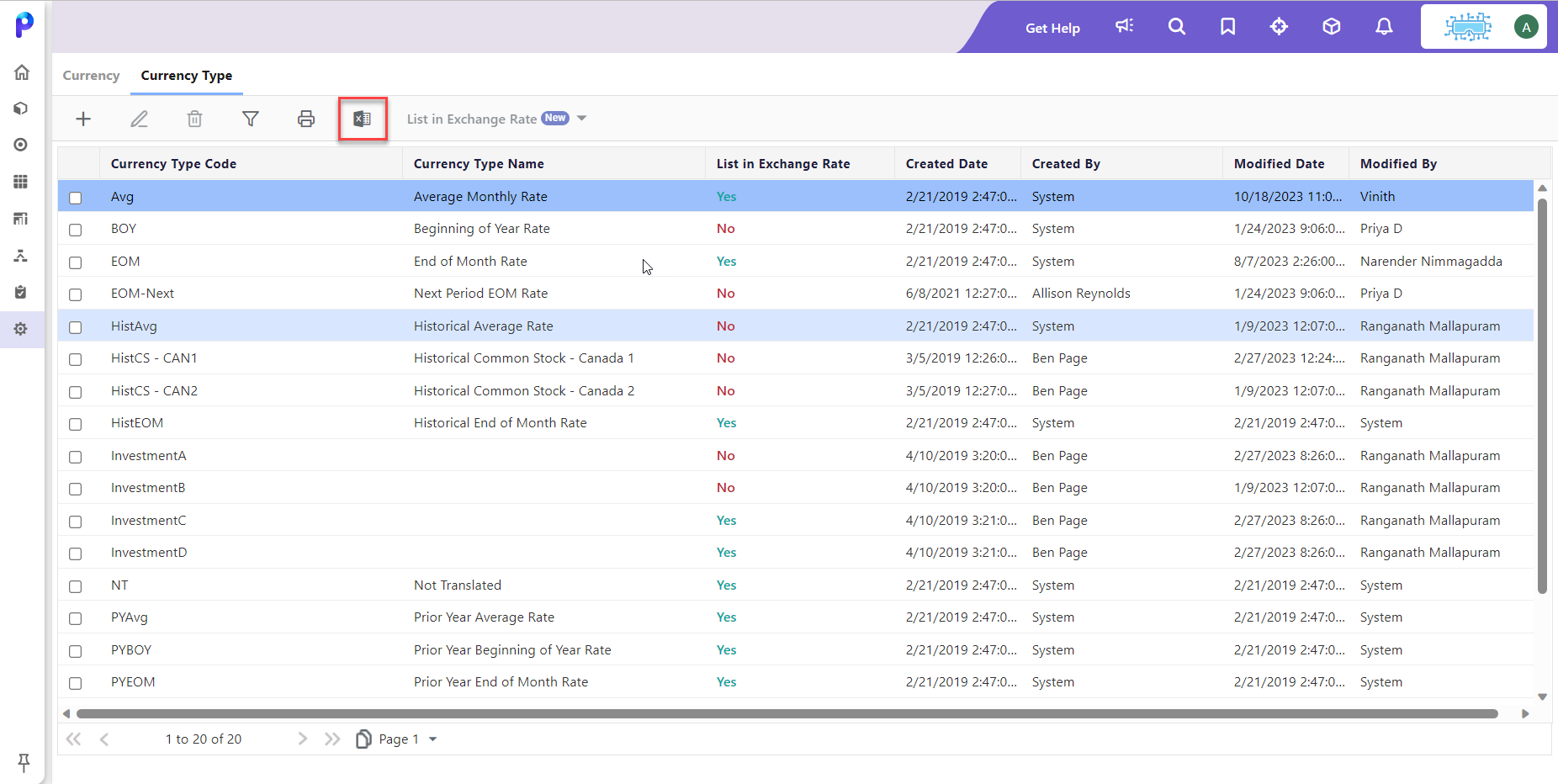
List in Exchange Rate
- Navigate to Maintenance > Currency > Currency Setup.
- Click Currency Type.
- Select the currency type from the list that you want to modify. Then, click List in Exchange Rate.
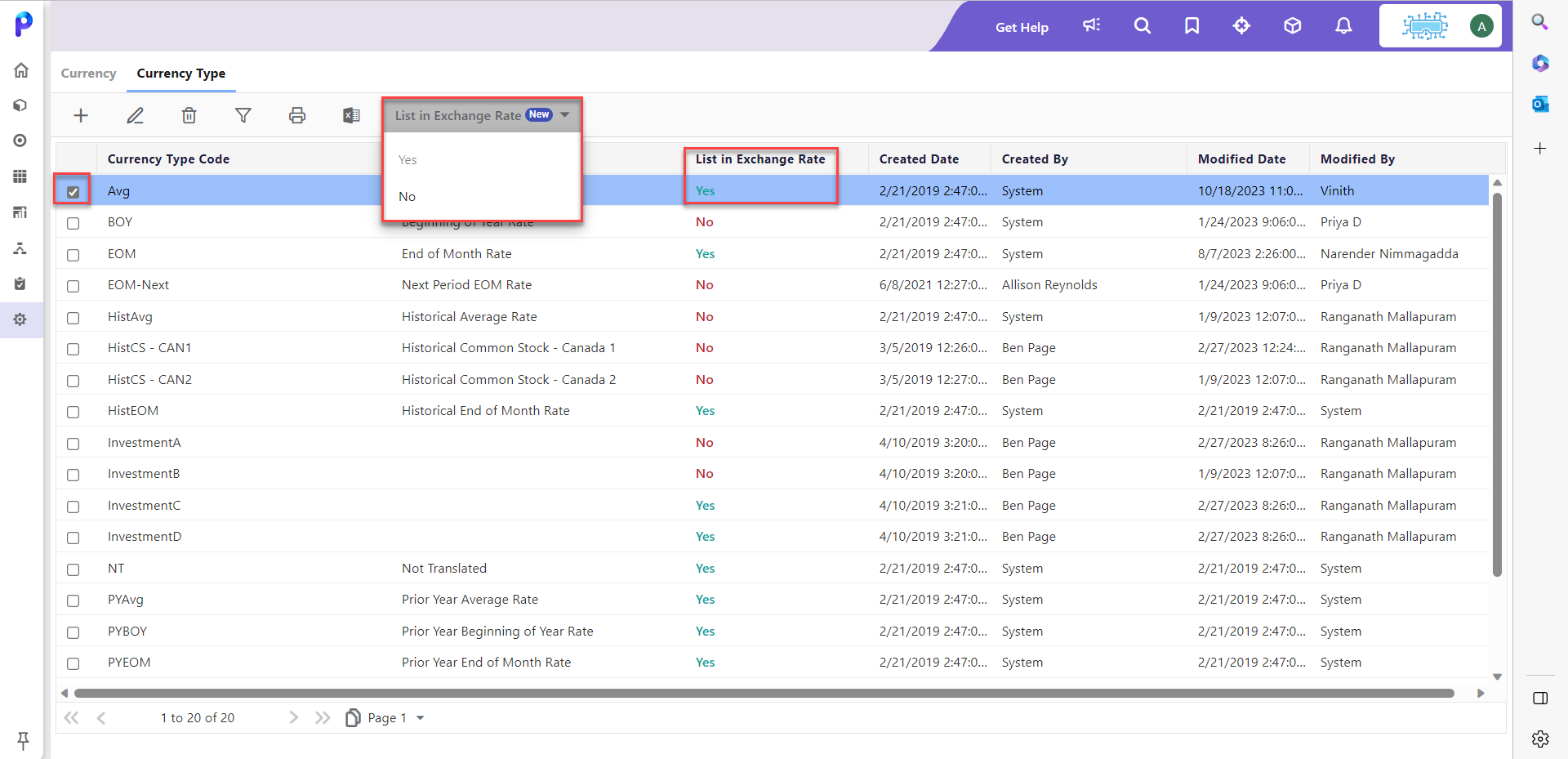
4. Select the required options (Yes/No) from the drop-down menu.
What are Currency and Currency Type Exceptions and When Do I Need Them?
When currency conversion is performed, different types of accounts need to be converted at different rates. For example, Income Statement accounts are usually converted using an AVG (average monthly) rate whereas Balance Sheet accounts are typically converted using an EOM (End of Month) rate.
To address each conversion, you need to create an exchange rate and assign it to accounts. Exchange rates are defined for each exchange rate type. The table below has different accounts and account types with varying exchange rate types.
Account | Account Type | Exchange Rate Type |
|---|---|---|
Sales | Income Statement | AVG |
Traveling Expenses | Income Statement | AVG |
Cash | Balance Sheet | EOM |
Creditors | Balance Sheet | EOM |
Equity | Balance Sheet | Historical |
Fixed Assets | Balance Sheet | EOM |

